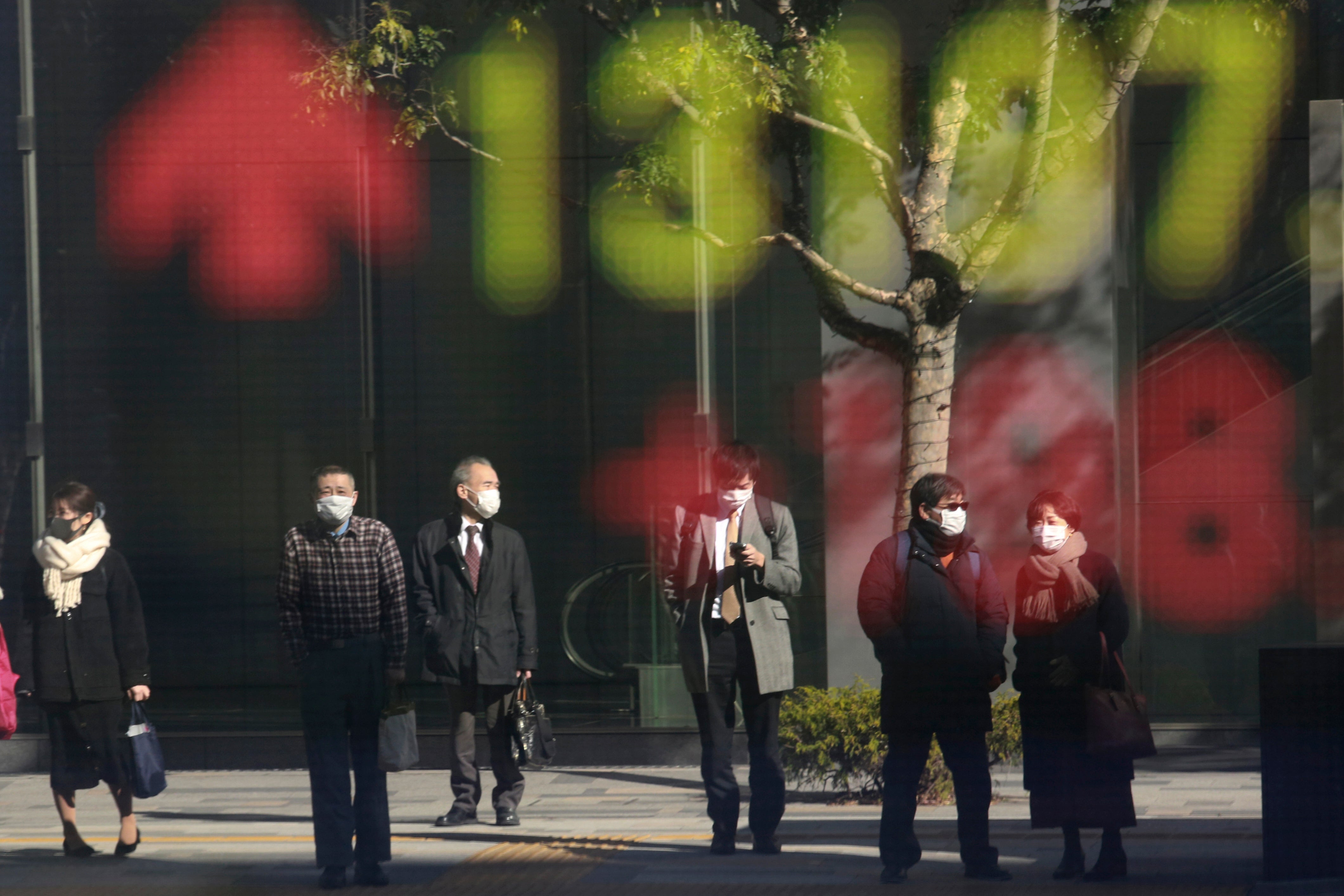Asian markets gain on hopes Biden will act on economy, virus
Asian shares were mostly higher ahead of Joe Biden’s inauguration as U.S. president, though worries about surging coronavirus cases sapped the Japanese market’s early gains

Your support helps us to tell the story
From reproductive rights to climate change to Big Tech, The Independent is on the ground when the story is developing. Whether it's investigating the financials of Elon Musk's pro-Trump PAC or producing our latest documentary, 'The A Word', which shines a light on the American women fighting for reproductive rights, we know how important it is to parse out the facts from the messaging.
At such a critical moment in US history, we need reporters on the ground. Your donation allows us to keep sending journalists to speak to both sides of the story.
The Independent is trusted by Americans across the entire political spectrum. And unlike many other quality news outlets, we choose not to lock Americans out of our reporting and analysis with paywalls. We believe quality journalism should be available to everyone, paid for by those who can afford it.
Your support makes all the difference.Asian shares were mostly higher ahead of Joe Biden's inauguration as U.S. president Wednesday, though worries about surging coronavirus cases sapped the Japanese market s early gains.
Japan's benchmark Nikkei 225 slipped 0.4% to finish at 28,523.26. Australia's S&P/ASX 200 added 0.4% to 6,770.40, while South Korea's Kospi edged up 0.6% to 3,112.03. Hong Kong's Hang Seng added 0.7% to 29,835.04, while the Shanghai Composite rose 0.1% to 3,570.40.
Hopes are growing that Biden’s planned stimulus for the American economy as well as measures to curb the pandemic will boost regional markets
While many Asian nations have fared better in the pandemic than European countries and the U.S., worries still run high. Main urban areas in Japan, including Tokyo, are under a state of emergency, with evening dining discouraged. Critics say that's not enough, as deaths related to COVID-19 have been rising.
“Chinese New Year is less than a month away. With COVID infection numbers already on the rise again in parts of Asia, there are concerns about what the holiday season may mean for efforts to contain the virus’s spread,” said Stephen Innes, chief global market strategist at Axi.
On Wall Street, the S&P 500 rose 30.66 points, or 0.8%, to 3,798.91, pulling to within 1% of its record high set earlier this month. The Dow Jones Industrial Average added 116.26 points, or 0.4%, to 30,930.52. The Nasdaq composite gained 198.68 points, or 1.5%, to 13,197.18.
About 60% of the companies in the S&P benchmark index rose. Technology, communication services and health care stocks accounted for much of the rally, though energy sector companies notched the biggest gain.
Traders continued to bid up shares in smaller companies, a sign of confidence in the prospects for future economic growth. The Russell 2000 index picked up 27.94 points, or 1.3%, to 2,151.14.
U.S. markets were closed Monday in observance of Martin Luther King Day.
The gains this week marked a reversal from last week, when stocks ran out of steam after a strong start to the year. Markets have been rising on enthusiasm about a coming economic recovery as more people are inoculated with COVID-19 vaccines and Washington gets set to try for another round of economic stimulus.
Janet Yellen, Biden’s nominee to be Treasury secretary, told the Senate Finance Committee during her confirmation hearing that the incoming administration would focus on winning quick passage of its $1.9 trillion pandemic relief plan.
“More must be done,” Yellen said. “Without further action, we risk a longer, more painful recession now — and long-term scarring of the economy later.”
The plan would include $1,400 cash payments for most Americans. Democrats are also pushing for faster rollout of COVID-19 vaccines, a higher minimum wage for workers and enhanced benefits for laid-off workers. The hope is that such stimulus can carry the economy until later this year, when more widespread vaccinations get life returning to some semblance of normal.
“If most of this is implemented, it does suggest significant pickup in economic growth as we head through to the fourth quarter of this year,” said David Kelly, chief global strategist at JPMorgan Funds.
In energy trading, benchmark U.S. crude added 31 cents to $53.29 a barrel. Brent crude, the international standard, rose 35 cents to $56.25.
In currency trading, the U.S. dollar slipped to 103.74 Japanese yen from 103.99 yen. The dollar cost $1.2146, up from $1.2115.
___
AP Business Writers Stan Choe, Damian J. Troise and Alex Veiga contributed.